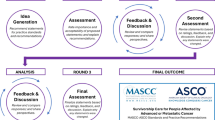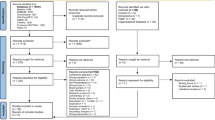Abstract
Aim
There is a growing population of lung cancer survivors who may have unmet physical, psychological, and practical needs as they transition from active treatment into recovery. The specific needs and best ways to meet them are unclear in this population. This paper describes the development and outcomes of a program aimed to transition patients to survivorship.
Subject and methods
Patients with early-stage lung cancer were assessed for the presence and severity of unmet physical, psychological, and practical needs at the end of active treatment. Patients also attended a multidisciplinary clinic visit to create an individualized survivorship care plan and provide appropriate referrals. They were surveyed 3 months later to assess effectiveness of the program.
Results
Eighty-four participants were enrolled in the program. All reported at least one unmet need, with a mean of seven unmet needs, particularly related to breathing, fatigue, pain, and fear/anxiety. Following program participation, there were fewer and/or less severe needs.
Conclusions
The Bridge program identified and decreased the number and severity of unmet needs through connecting survivors to local resources. Challenges to program implementation included hesitancy of providers to refer, time constraints of survivors and staff, and lack of community resources, especially for identified mental health needs.


Similar content being viewed by others
References
American Cancer Society (2019) Key statistics for lung cancer. http://www.cancer.org/content/cancer/en/cancer/lung-cancer/about/key-statistics.html. Accessed 13 Nov 2019
Berman AT, DeCesaris CM, Simone CB et al (2016) Use of survivorship care plans and analysis of patient-reported outcomes in multinational patients with lung cancer. J Oncol Pract 12:e527–e535
Eichler M, Hechtner M, Wehler B et al (2018) Psychological distress in lung cancer survivors at least 1 year after diagnosis—results of a German multicenter cross-sectional study. Psychooncology 27:2002–2008
Giuliani ME, Milne RA, Puts M et al (2016) The prevalence and nature of supportive care needs in lung cancer patients. Curr Oncol 23:258–265
Ha D, Ries AL, Mazzone PJ, Lippman SM, Fuster MM (2018) Exercise capacity and cancer-specific quality of life following curative intent treatment of stage I–IIIA lung cancer. Support Care Cancer 26:2459–2469
Halpern MT, McCabe JS, Burg MA (2016) The cancer survivorship journey: models of care, disparities, barriers, and future directions. Am Soc Clin Oncol Educ Book 36:231–239. https://doi.org/10.1200/EDBK_156039
Hewitt M, Greenfield S, Stovall E (2005) From cancer patient to cancer survivor: lost in transition. National Academies Press, Washington, DC
Jung JY, Lee JM, Kim MS et al (2018) Comparison of fatigue, depression, and anxiety as factors affecting posttreatment health-related quality of life in lung cancer survivors. Psychooncology 27:465–470
Li J, Girgis A (2006) Supportive care needs: are patients with lung cancer a neglected population? Psychooncology 15:509–516
National Cancer Institute (2018) Cancer statistics. https://www.cancer.gov/about-cancer/understanding/statistics. Accessed 26 Nov 2019
Reb A, Ruel N, Fakih M et al (2017) Empowering survivors after colorectal and lung cancer treatment: pilot study of a self-management survivorship care planning intervention. Eur J Oncol Nurs 29:125–134
Salz T, McCabe MS, Onstad EE et al (2014) Survivorship care plans: is there buy-in from community oncology providers? Cancer 120:722–730
Vijayvergia N, Shah PC, Denlinger CS (2015) Survivorship in non-small cell lung cancer: challenges faced and steps forward. J Natl Compr Canc Netw 13:1151–1161
Acknowledgments
We wish to thank the cancer center staff at United Hospital Center and the Charleston Area Medical Center for their collaboration in this project.
Funding
This study was funded by the Bristol Myers Squibb Foundation (grant no. 17-132).
Author information
Authors and Affiliations
Corresponding author
Ethics declarations
Conflict of interest
None of the authors have any declarations of conflict of interest related to this work.
Ethical approval
This project was reviewed and approved by the West Virginia University Institutional Review Board for the Protection of Human Subjects (protocol no. 1612405699). Informed consent was obtained from all participants prior to any data collection.
Additional information
Publisher’s note
Springer Nature remains neutral with regard to jurisdictional claims in published maps and institutional affiliations.
All authors contributed to the study conception and design. Material preparation, data collection, and analysis were performed by Anne K. Swisher, Stephenie Kennedy-Rea, Abby Starkey, and Adrienne Duckworth. The first draft of the manuscript was written by Anne K. Swisher and all authors commented on previous versions of the manuscript. All authors read and approved the final manuscript.
Rights and permissions
About this article
Cite this article
Swisher, A.K., Kennedy-Rea, S., Starkey, A. et al. Bridging the gap: identifying and meeting the needs of lung cancer survivors. J Public Health (Berl.) 30, 607–612 (2022). https://doi.org/10.1007/s10389-020-01332-w
Received:
Accepted:
Published:
Issue Date:
DOI: https://doi.org/10.1007/s10389-020-01332-w




